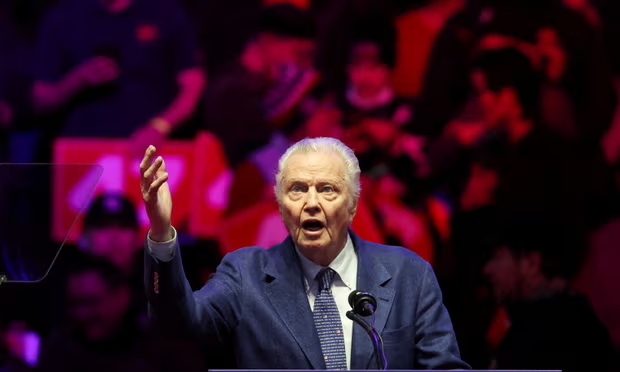
Actor was given the task by Trump to devise a strategy to rescue the film industry, but his plan only involved imposing tariffs in specific situations.

Jon Voight delivered a speech at a rally in support of President Donald Trump in January 2025. The actor is one of Trump’s three’special ambassadors’ to the film industry and has proposed a strategy to attract movie productions back to the US, which includes only ‘limited’ tariffs. evelyn hockstein/reuters.
Film industry.
Trump advocated for imposing a 100% tariff on foreign films just hours after Jon Voight suggested implementing ‘limited’ tariffs.
Actor was given the task by Trump to devise a strategy to rescue the film industry, but his plan only involved imposing tariffs in specific situations.
Sian Cain.
Tue 6 may 2025 02:58:59 UTC+0
Share:
Us president donald trump announced his 100% tariff on films ‘coming into our country produced in foreign lands’ one day after meeting with actor jon voight to discuss his proposals to bring film production back to the us – which only suggested that tariffs could be used ‘in certain limited circumstances’.
The midnight cowboy and heat actor, who was appointed a’special ambassador’ to hollywood by trump, has been meeting with studios, streamers, unions and guilds for months to develop a plan to lure film and television productions back to the us. Production companies frequently look for more affordable options or tax benefits in other countries like Canada, Australia, the UK, New Zealand, Hungary, Italy, and Spain.
On the weekend voight and his manager and film producer steven paul met with trump at mar-a-lago to deliver his ‘comprehensive plan’ – just before trump stunned the international film industry with the idea of a 100% tariff on all films ‘coming into our country produced in foreign lands’.

Only the top-level details of voight’s proposal were disclosed on Monday, but the only mention of tariffs in the plan was that they could be employed ‘in certain limited circumstances’ – in contrast to trump’s broad declaration. His primary suggestions revolve around implementing federal tax incentives, modifying tax regulations, establishing co-production agreements with foreign nations, and providing financial support for theater owners and production/post-production companies.
Hollywood productions are often filmed in countries such as canada, australia, the uk, new zealand, hungary, italy and spain in order to take advantage of local tax incentives, talent pools and landscapes that look geographically similar enough to stand in for more expensive us locations.
In a statement on monday voight said the white house was now’reviewing’ his proposals.
‘the president loves the entertainment business and this country, and he will help us make hollywood great again,’ voight said
The white house walked back on trump’s announcement afterwards, saying that ‘no final decisions on foreign film tariffs have been made’.
Film production in los angeles has declined almost 40% over the last decade, according to filmla. Not all of this business went overseas: other states such as new york and georgia have long offered generous tax incentives to attract productions.
Reactions in hollywood to trump’s announcement have been varied, in the absence of detail, it remains unclear how it would be decided which films would qualify as ‘foreign’. Marvel’s new film thunderbolts, for instance, was mostly made in the us but included some shoots on location in malaysia and a score recorded in london. The tariff would not address the higher cost of shooting in the United States.
Us performers union sag-aftra seemed broadly positive, saying it’supports efforts to increase movie, television and streaming production in the us’ and that it would ‘advocate for policies that strengthen our competitive position, accelerate economic growth and create good middle class jobs for american workers’.
The international alliance of theatrical stage employees (iatse) called for a ‘balanced federal response’, with iatse’s international president matthew loeb saying the crew union had’recommended that the trump administration implement a federal film production tax incentive and other domestic tax provisions to level the playing field for american workers’, but that ‘any eventual trade policy must do no harm to our canadian members – nor the industry overall.’.
Australia has responded with caution: the country has been enticed by large-scale productions, such as tent pole movies, through various incentives, including the federal government’s 30% rebate for big-budget film projects filmed in Australia. Approximately half of the australian a$1.7bn expenditure on screen production in 2023-24 was allocated to international productions.
Australia’s arts minister, Tony Burke, expressed his vigilance in closely monitoring the situation.
‘nobody should be under any doubt that we will be standing up unequivocally for the rights of the australian screen industry,’ burke said
In the uk, government officials and senior figures from britain’s multibillion-pound production industry immediately made plans to discuss trump’s threat, with some in the industry warning ministers that such a tariff could wipe out the uk film industry.
Voight, Gibson, and Stallone were chosen by Trump to serve as’special ambassadors to Hollywood’, a position the president has described as both great and troubled.




